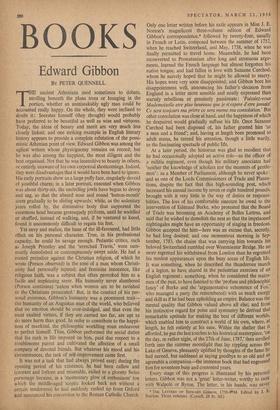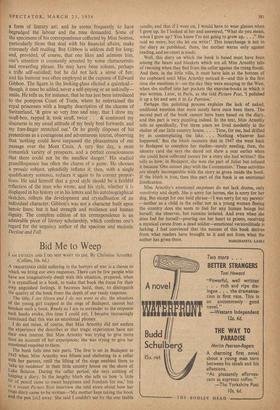BOOKS
Edward Gibbon
BY PETER QUENNELL THE ancient Athenians used sometimes to debate, strolling beneath the plane trees or lounging in the portico, whether an unmistakably ugly man could be accounted really happy. On the whole, they were inclined to doubt it : Socrates himself (they thought) would probably have preferred to be beautiful as well as wise and virtuous. Today, the ideas of beauty and merit are very much less closely linked; and one striking example in English literary history appears to provide a complete refutation of the pessi- mistic Athenian point of view. Edward Gibbon was among the ugliest writers whose physiognomy remains on record; but he was also among the happiest, the most diligent and the best organised. Not that he was insensitive to beauty in others, or entirely unaware of his own corporeal shortcomings. Indeed, they were disadvantages that it would have been hard to ignore. His early portraits show us a large puffy face, singularly devoid of youthful charm; in a later portrait, executed when Gibbon was about thirty-six. the encircling jowls have begun to droop and sag, so that the absurd nose and round 'button-mouth' seem gradually to be sliding upwards; while, as the sedentary years rolled by, the diminutive body that supported the enormous head became grotesquely piriform, until he waddled or shuffled, instead of walking, and, if he ventured to kneel. found it uncommonly difficult to regain his feet. Yet envy and malice, the bane of the ill-favoured, had little effect on his personal character. True, in his professional capacity, he could be savage enough. Pedantic critics, such as Joseph Priestley and the `wretched Travis,' were sum- marily demolished or contemptuously swept aside. He had a rooted prejudice against the Christian religion, of which he wrote (Porson observed) in the tone of a man whom Christi- anity had personally injured; and feminine innocence, like religious faith, was a subject that often provoked him to a facile and unpleasing sneer. His humanity never slumbered (Porson continues) 'unless when women are to be ravished or the Christians persecuted.' But, in the conduct of his per- sonal existence, Gibbon's humanity was a prominent trait— the humanity of an Augustan man of the world, who believed that no emotion should be over-indulged, and that even the most exalted virtues, if they are carried too far, are apt to do more harm than good. In order to contribute to the happi- ness of mankind, the philosophic worldling must endeavour to perfect himself. Thus, Gibbon performed the social duties that his rank in life imposed on him, paid due respect to a troublesome parent and cultivated the affection of a small company of devoted friends. But whatever his mood and his circumstances, the task of self-improvement came first. .
It was not a task that had always proved easy; during the opening period of his existence, he had been callow and ignorant and forlorn and miserable, exiled to a gloomy Swiss parsonage because, in a 'momentary glow of enthusiasm' (on which the middle-aged sceptic looked back not without a certain tenderness) he had suddenly rushed up from Oxford and announced his conversion to the Roman Catholic Church. Only one letter written before his exile appears in Miss J. E. Norton's magnificent three-volume edition of Edward Gibbon's correspondence,* followed by twenty-four, usually in French or Latin, composed between the summer of 1752, when he reached Switzerland, and May, 1758, when he was finally permitted to travel home. Meanwhile, he had been reconverted to Protestanism after long and strenuous argu- ments, learned the French language but almost forgotten his native tongue, and had fallen in love with Suzanne Curchod, whom he naively hoped that he might be allowed to marry. His hopes were very soon disappointed; and Gibbon bore his disappointment well, announcing his father's -decision from England in a letter more sensible and neatly expressed than warmly rebellious or genuinely passionate : 'Puissiez-vous Mademoiselle etre plus heureuse que je n'espere d'etre jamais! Ce sera toujours ma priere ce sera meme ma consolation.' But other consolation was close at hand, and the happiness of which he despaired would gradually suffuse his life. Once Suzanne Curchod had been disposed of, his father greeted him `as a man and a friend'; and, having at length been promoted to adult status, he turned his attention, though a little warily, to the fascinating spectacle of public life.
At a later period, the historian was glad to recollect that he had occasionally adopted an active role—as the officer of a militia regiment, even though his military associates had 'neither the knowledge of scholars nor the manners of gentle- men': as a Member of Parliament, although he never spoke: and as one of the Lords Commissioners of Trade and Planta- tions, despite the fact that this high-sounding post, which increased his annual income by seven or eight hundred pounds, brought with it very little in the way of duties or. responsi- bilities. The loss of his comfortable sinecure he owed to the intervention of Edmund Burke, who protested that the Board of Trade was becoming an Academy of Belles Lettres, and said that he wished to demolish the nest so that the imprisoned nightingales might have an opportunity of singing in freedom. Gibbonaccepted the hint—here was an excuse that, secretly, he had long desired; and one momentous morning in Sep- tember, 1783, the chaise that was carrying him towards his beloved Switzerland rumbled over Westminster Bridge. He no more regretted his withdrawal from London than he regretted his modest appearances upon the busy scene of English life. It was something, when he described the thunderous march of a legion, to have shared in the pedestrian exercises of an English regiment : something, when he considered the states- men of the past, to have listened to the 'profuse and philosophic fancy' of Burke and the 'argumentative vehemence of Fox,' who managed a party (he remembered) with as much energy and skill as if he had been upholding an empire. Balance was the mental quality that Gibbon valued above all else; and from his instinctive regard for poise and symmetry he derived that remarkable aptitude for making the best of different worlds, which enabled him to construct a world of his own, where, at length, he felt entirely at his ease. Within the shelter that it afforded, he put the last touches to his historical masterpiece, 'on the day, or rather night, of the 27th of June, 1787,' then strolled forth into the summer moonlight that lay rippling across the Lake of Geneva, pleasantly uplifted by thoughts of the fame he had earned, but saddened at saying goodbye to so old and so agreeable a companion—the immense book that had engrossed him for seventeen busy and contented years. Every stage of this progress is illustrated by his personal letters. Gibbon was not a 'great' letter-writer, worthy to rank witli Walpole or Byron. The letter, in his hands, was never * Tnu Lerrnus OF EDWARD GIBBON, 1750-1+794. Edited by J. E. Norton. Three volumes. (Cassell, £8 8s. Od.) a form of literary art; and he seems frequently to have begrudged the labour and the time demanded. Some of the specimens of his correspondence collected by Miss Norton, particularly those that deal with his financial affairs, make extremely dull reading. But Gibbon is seldom dull for long; and, provided, of course, that one likes and admires him, one's attention is constantly arrested by some characteristic and rewarding phrase. He may have been solemn, perhaps a trifle self-satisfied; but he did not lack a sense of fun; and his humour was often employed at the expense of Edward Gibbon. The figure in the looking-glass elicited a quizzical— though, it must be added, never a self-pitying or an unkindly— smile. He tells us, for instance, that he has just been introduced to the pompous Court of Turin, where he entertained the royal princesses with a lengthy description of the charms of Switzerland, It grew so very free and easy, that I drew my snuff-box, rapped it, took snuff, twice . . . & continued my discourse in my usual attitude of my body bent forwards, and my fore-finger stretched out.' Or he gently disposes of his pretentions as a courageous and adventurous tourist, observing that 'nothing could have surpassed the pleasantness of our passage over the Mont Cenis. A very fine day, a most romantick variety of prospects, and a perfect consciousness that there could not be the smallest danger.' His studied grandiloquence has often the charm of a game. He chooses a prosaic subject, splendidly inflates it, then, with a single qualificatory sentence, reduces it again to its correct propor- tions. He said himself that a good style should be a faithful reflection of the man who wrote; and his style, whether it is displayed in his history or in his letters and his autobiographical sketches, reflects the development and crystallisation of an individual character. Gibbon's was not a character built upon heroic lines; but it had strength and resilience and human dignity. The complete edition of his correspondence is an admirable piece of literary scholarship, which confirms one's regard for the ungainly author of the spacious and majestic Decline and Fall.



































 Previous page
Previous page